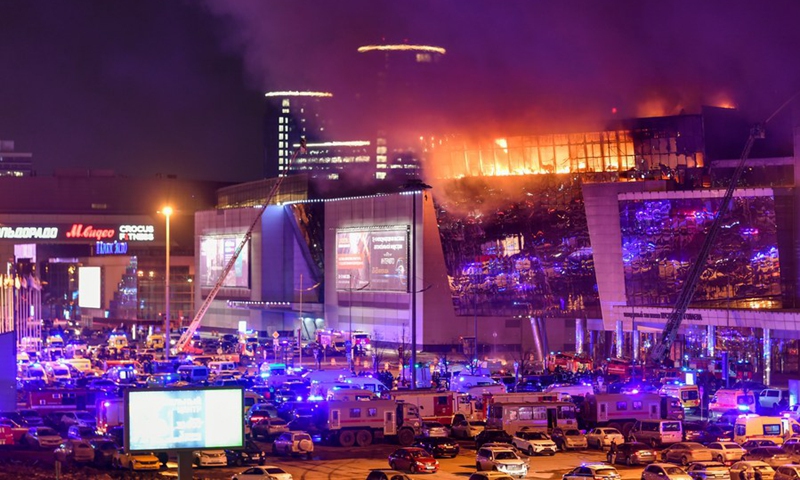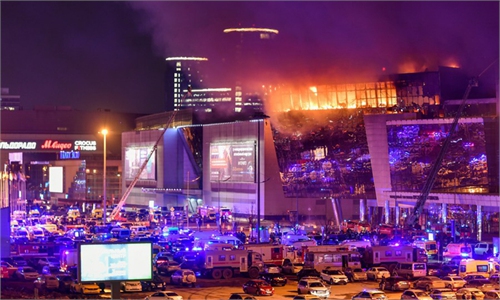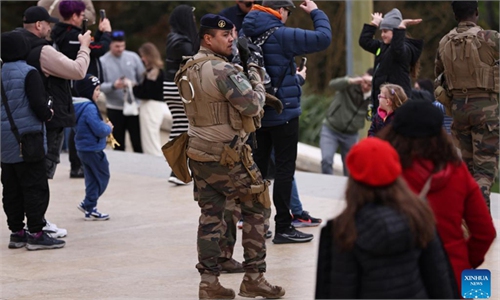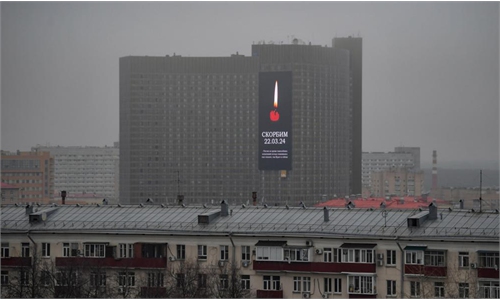
Smoke from fire rises above the burning Crocus City Hall concert venue following a shooting incident in the northwest of Moscow, Russia, on March 22, 2024.(Photo: Xinhua)
The terrorist attack at the Crocus City Hall in Krasnogorsk, Moscow, on March 22 was an unprecedented event and a significant challenge for the Russian state and society. The attack, which involved a mass shooting and arson of the concert hall, killed at least 139 people (three of them children) and injured more than 182 people.This attack is now considered one of the largest terrorist incidents in the history of modern Russia, second only to the terrorist attack in Beslan (2004). Russian President Vladimir Putin declared March 24 a day of national mourning. The attack also drew international condemnation.
The exact number of terrorists involved in the attack has not yet been officially disclosed, but according to preliminary reports, there may have been five or more individuals. The security forces of the Russian Federation reported the detention of 11 people. Four suspects are charged with act of terrorism. According to the conclusion of the Ministry of Internal Affairs of the Russian Federation, all the suspects are foreign citizens, a factor that has caused significant public concern in Russia.
The attack was carried out by terrorists who were professionals with military and sports training. This was clear in their speed and coordination of actions, as well as their good orientation in the building and competent withdrawal after the completion of the terrorist action. The Islamic State-Khorasan Province (IS-K) claimed responsibility for Friday's deadly massacre. However, this claim is questionable among experts, as it is known that IS has long been acting as a kind of "franchise" for a variety of terrorist groups.
Only an objective and high-quality investigation of what happened, recognized by the international community, will allow us to determine the structures and forces behind the extremist group that committed this terrorist act.
As far as I understand, the event at Crocus City Hall will worsen the already strained relations between Russia and Ukraine, especially considering the reactions of Ukrainian elites and a significant portion of the Ukrainian online community.
Under the current conditions, it can be assumed that the military conflict in Ukraine will obviously continue. The course of the conflict will depend on Russia's willingness to consolidate its own resources and the scale of Western assistance to Ukraine. At the same time, the Ukrainian army is under significant strain due to the depletion of its weapons stockpile and is transitioning to a strategic defense posture to slow down the Russian offensive by deploying additional military formations to the front lines. Despite this, there are still opportunities for peace talks with Ukraine, given the prevailing mood of Russian society, and international peaceful forces' efforts for promoting negotiations.
The "long war" is seen as undesirable for both Russia and the West. In addition, arming Ukraine with missiles and other weapons, which are being discussed and agreed upon by a number of European countries today, may lead to a situation fraught with world war, which obviously would not be desirable.
Based on this widespread opinion in today's Russia, reinforced by what happened in Crocus City Hall, it can be assumed that the fighting in Ukraine will continue, and Russia will strive to maintain the initiative in the conflict and consolidate its successes. Thus, pressure on Russia through terrorist methods will encourage it to continue its military efforts. At the same time, a prerequisite for the start of the peace process is the restoration of the minimum necessary trust in relations between Russia and the West. The tragedy in Krasnogorsk obviously does not strengthen such trust.
The author is a professor at the Siberian Institute of Management in Novosibirsk of Russia. opinion@globaltimes.com.cn



